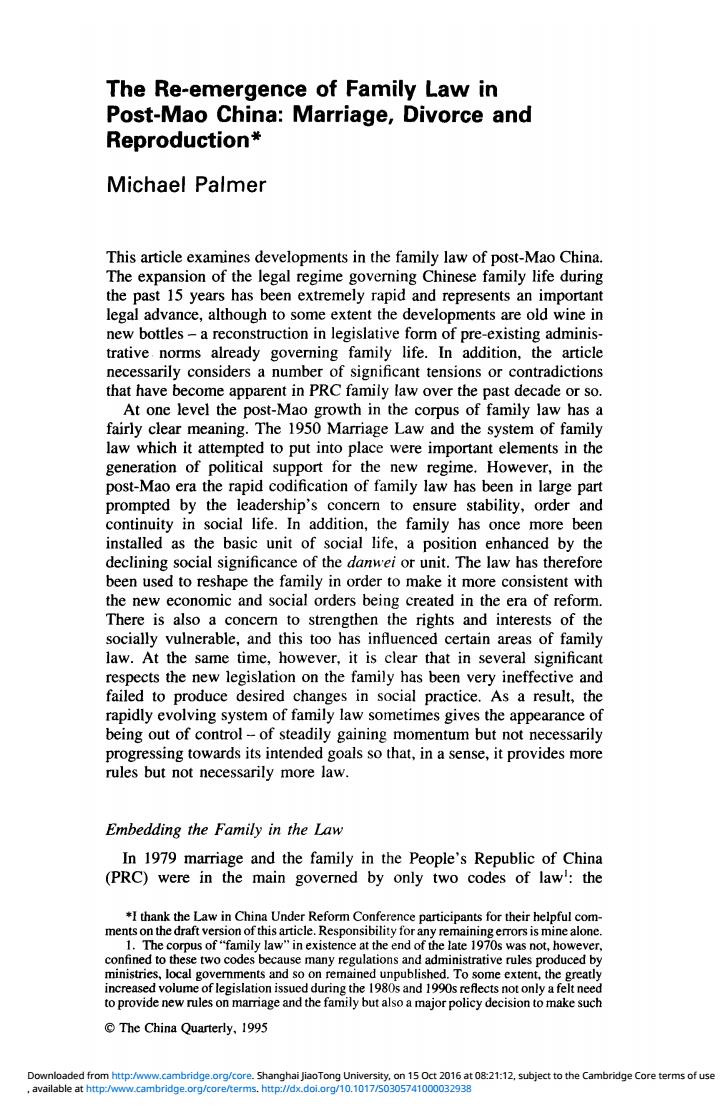正在加载图片...

The Re-emergence of Family Law in Post-Mao China:Marriage,Divorce and Reproduction* Michael Palmer This article examines developments in the family law of post-Mao China. The expansion of the legal regime governing Chinese family life during the past 15 years has been extremely rapid and represents an important legal advance,although to some extent the developments are old wine in new bottles-a reconstruction in legislative form of pre-existing adminis- trative.norms already governing family life.In addition,the article necessarily considers a number of significant tensions or contradictions that have become apparent in PRC family law over the past decade or so. At one level the post-Mao growth in the corpus of family law has a fairly clear meaning.The 1950 Marriage Law and the system of family law which it attempted to put into place were important elements in the generation of political support for the new regime.However,in the post-Mao era the rapid codification of family law has been in large part prompted by the leadership's concern to ensure stability,order and continuity in social life.In addition,the family has once more been installed as the basic unit of social life,a position enhanced by the declining social significance of the danwei or unit.The law has therefore been used to reshape the family in order to make it more consistent with the new economic and social orders being created in the era of reform. There is also a concern to strengthen the rights and interests of the socially vulnerable,and this too has influenced certain areas of family law.At the same time,however,it is clear that in several significant respects the new legislation on the family has been very ineffective and failed to produce desired changes in social practice.As a result,the rapidly evolving system of family law sometimes gives the appearance of being out of control-of steadily gaining momentum but not necessarily progressing towards its intended goals so that,in a sense,it provides more rules but not necessarily more law. Embedding the Family in the Law In 1979 marriage and the family in the People's Republic of China (PRC)were in the main governed by only two codes of law':the *I thank the Law in China Under Reform Conference participants for their helpful com- ments on the draft version of this article.Responsibility for any remaining errors is mine alone. 1.The corpus of "family law"in existence at the end of the late 1970s was not,however. confined to these two codes because many regulations and administrative rules produced by ministries,local governments and so on remained unpublished.To some extent,the greatly increased volume of legislation issued during the 1980s and 1990s reflects not only a felt need to provide new rules on marriage and the family but also a major policy decision to make such The China Quarterly,1995 Downloaded from http:/www.cambridge.org/core.Shanghai JiaoTong University,on 15 Oct 2016 at 08:21:12,subject to the Cambridge Core terms of use available at http:/www.cambridge.org/core/terms.http://dx.doi.org/10.1017/50305741000032938The Re-emergence of Family Law in Post-Mao China: Marriage, Divorce and Reproduction* Michael Palmer This article examines developments in the family law of post-Mao China. The expansion of the legal regime governing Chinese family life during the past 15 years has been extremely rapid and represents an important legal advance, although to some extent the developments are old wine in new bottles - a reconstruction in legislative form of pre-existing administrative norms already governing family life. In addition, the article necessarily considers a number of significant tensions or contradictions that have become apparent in PRC family law over the past decade or so. At one level the post-Mao growth in the corpus of family law has a fairly clear meaning. The 1950 Marriage Law and the system of family law which it attempted to put into place were important elements in the generation of political support for the new regime. However, in the post-Mao era the rapid codification of family law has been in large part prompted by the leadership's concern to ensure stability, order and continuity in social life. In addition, the family has once more been installed as the basic unit of social life, a position enhanced by the declining social significance of the danwei or unit. The law has therefore been used to reshape the family in order to make it more consistent with the new economic and social orders being created in the era of reform. There is also a concern to strengthen the rights and interests of the socially vulnerable, and this too has influenced certain areas of family law. At the same time, however, it is clear that in several significant respects the new legislation on the family has been very ineffective and failed to produce desired changes in social practice. As a result, the rapidly evolving system of family law sometimes gives the appearance of being out of control - of steadily gaining momentum but not necessarily progressing towards its intended goals so that, in a sense, it provides more rules but not necessarily more law. Embedding the Family in the Law In 1979 marriage and the family in the People's Republic of China (PRC) were in the main governed by only two codes of law1 : the *I thank the Law in China Under Reform Conference participants for their helpful comments on the draft version of this article. Responsibility for any remaining errors is mine alone. 1. The corpus of "family law" in existence at the end of the late 1970s was not, however, confined to these two codes because many regulations and administrative rules produced by ministries, local governments and so on remained unpublished. To some extent, the greatly increased volume of legislation issued during the 1980s and 1990s reflects not only a felt need to provide new rules on marriage and the family but also a major policy decision to make such © The China Quarterly, 1995 , available at http:/www.cambridge.org/core/terms. http://dx.doi.org/10.1017/S0305741000032938 Downloaded from http:/www.cambridge.org/core. Shanghai JiaoTong University, on 15 Oct 2016 at 08:21:12, subject to the Cambridge Core terms of use